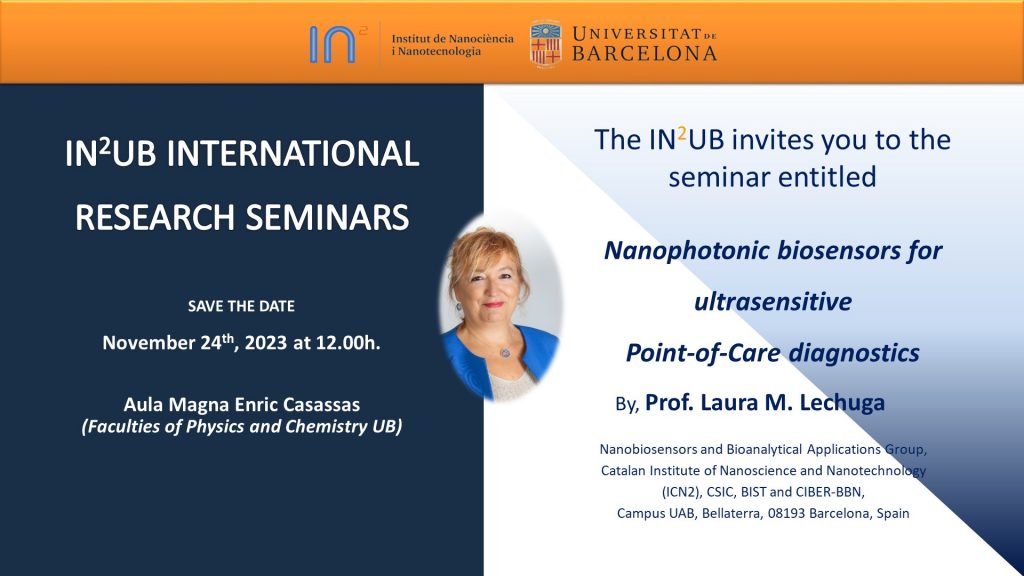IN²UB INTERNATIONAL RESEARCH SEMINARS
Nanophotonic biosensors for ultrasensitive Point-of-Care diagnostics
By, Prof. Laura M. Lechuga, Nanobiosensors and Bioanalytical Applications Group, Catalan Institute of Nanoscience and Nanotechnology (ICN2), CSIC, BIST and CIBER-BBN, Campus UAB, Bellaterra, 08193 Barcelona, Spain
Date and Venue: November 24th, 2023 at 12h – Aula Magna Enric Casassas (Faculties of Physics and Chemistry UB)
(Chaired by Dr. Adriana I. Figueroa, IN²UB and Faculty of Physics)
Abstract:
COVID-19 pandemics has evidenced the urgent need of having portable diagnostic tools that enable rapid testing and screening of the population with sensitivity and specificity levels comparable to laboratory techniques. Biosensor technology is one of the best prepared to tackle the challenging goal of offering fast and user-friendly diagnostics tests than can be employed at the point-of-need. Photonic biosensors are systems that seize different light-based phenomena for the fast detection and quantification of substances. Specifically, nanophotonic biosensors based on evanescent wave detection can provide sensitive, reliable, and selective analysis, while reducing test and therapeutic turnaround times, decreasing and/or eliminating sample transport, and using low sample volume.
Our main objective is to achieve ultrasensitive Point-of-care (POC) platforms for label-free analysis using nanophotonics biosensing technologies and custom-designed biofunctionalization protocols, accomplishing the requirements of disposability and portability. We have demonstrated cutting-edge nanophotonic biosensors based on Nanoplasmonics and on Silicon photonics technologies that enable ultrasensitive analysis of body fluids in few minutes. By custom tailoring the biochemistry of the sensor biochips, our POC nanophotonic biosensor technology can perform direct detection of proteins, genetic biomarkers, or pathogens within <15 min, with high sensitivity and selectivity. The diagnostic potential has been demonstrated and validated among others, for the drug monitoring of anticoagulants in plasma, antibiotic allergy diagnosis in plasma, early cancer diagnosis (colorectal and lung cancer) and bacterial, and viral infectious diseases.
Our nanophotonic biosensor technology paves the way for modern decentralised disease diagnostics. The nanobiosensor POC devices could be employed by non-expert personnel at the bedside of patients and could have a strong impact in guiding quick medical decisions across various clinical scenarios.
About the author:
Prof. Laura M. Lechuga is Full Professor of the Spanish National Research Council (CSIC) and Head of the Nanobiosensors and Bioanalytical Applications Group at the Catalan Institute of Nanoscience and Nanotechnology (ICN2) in Barcelona (Spain) and at the Networking Biomedical Research Center (CIBER-BBN).
The principal focus of her research is the development of novel nanobiosensor devices based on Nanoplasmonics and Silicon Photonics principles for point-of-care diagnostics. Prof. Lechuga is a world reference in the Photonic Biosensor area, making key contributions and opening new horizons in this field. Her research activities cover from fundamental research to the technological operation of complete sensing platforms, including the technological transfer into products of social applicability.
She has published over 300 articles, book chapters and proceedings, has 8 families of patents and four trade secrets, has co-founded two spin-offs companies and has presented her work in more than 490 invited talks.
The quality of her research has been recognised by more than 22 prestigious prizes and awards, as the Spanish National Research Award in 2020, the King Jaume I award in New Technologies in 2020, the Ada Byron 2020 Prize, the Physics, Innovation and Technology Prize from the Spanish Royal Physics Society (RSEF) and BBVA Foundation (2016), the Lung Ambition Alliance Prize from ASTRAZENECA, and the National Prize in Nanotechnology, among many others.

